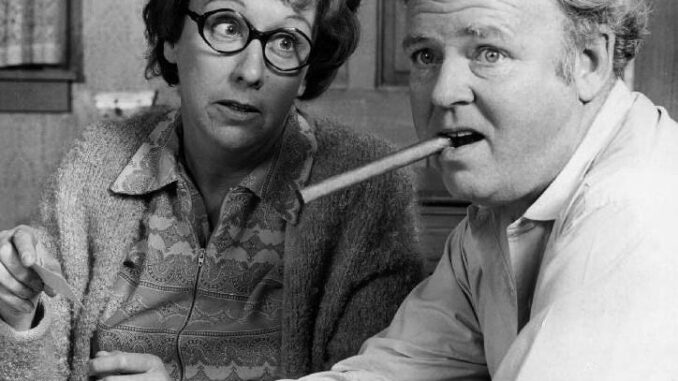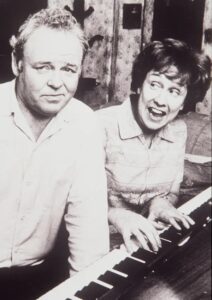
The issues and lessons of ‘All in the Family’ still resonate
Actor Carroll O’Connor as Archie Bunker in “All in the Family.”
Actor Carroll O’Connor as Archie Bunker in “All in the Family.”AP
One of them spewed ethnic slurs. Another was flighty and yet grounded. A third loved to dance, and danced around her parents’ bickering. And the last of them was a rebel without a pause.
They were Archie, Edith, Gloria, and Meathead. Actually the fourth one’s name was Mike but few today remember that. Even now, a half-century later, they need no introduction, nor a last name, though two of them carry the enduringly famous surname Bunker. They were the principals in “All in the Family,” and for a remarkable nine years they held the attention of nearly every American family, even as they reflected just one kind of American family: white, working class, and marinated in the prejudice — and protests against prejudice — of its time.
“All in the Family” surfaced the barbed edge of a divided nation in a way that no TV show had done before, and somehow also made that hard work hilarious. Its creator, Norman Lear, doubtlessly hoped that the America of his day would evolve for the better, that Bunkerism would fall out of favor, maybe in part because of his show’s brazen honesty. But the rise of Trump and Trumpism, culminating in the unthinkable events of last week, tells another story. And so now, as the 50th anniversary of the first episode approaches, the story lines and the punchlines remain strikingly fresh and relevant.
The generations still collide, the bigots still blur, the genders still clash, the American dream and who owns it are still the topics of the American conversation, although today those conversations usually occur online, the modern equivalent of the Bunker family dinner table at 704 Hauser St. in Queens.

“To some degree, we still contend with these issues,” Lear said in an interview for this retrospective. “They haven’t gone away. We’ve moved on but we haven’t moved off these questions. It isn’t as if the world is rid of Archie Bunker.”
Nor is the world rid of the unexamined prejudice Archie personified — far from it. Nor of deep, abiding worries that defined Edith. Nor of a sunny outlook amidst the gloom, which was Gloria’s gift. Nor even — especially — of dissent, perhaps the longest-lasting American cultural attribute, as ancient as Boston’s pre-Revolutionary Committees of Correspondence and as recent as the country’s 21st-century racial reckoning, which Mike certainly would have embraced. Can anyone doubt that Archie and Meathead would have sparred last summer over whether to place a Black Lives Matter lawn sign outside the three-story house in Astoria?
“This shows normalized battling over current events in the living room,” said M.V. Lee Badger, director of the School of Policy at UMass Amherst.
Its 205 episodes were groundbreaking in the world of television but would only spotlight, not shatter some of America’s most persistent instincts and impulses.
“We broke ground but we didn’t erect a building,” said Sally Struthers, who played Gloria, in a recent telephone conversation. “It takes a long time for social justice to permeate every human soul. We still have a lot of the Archie Bunker problem, and the big change I expected the show would help promote never happened.”
Even scholars too young to have viewed the series when it was recorded, live in front of a studio audience — but who have reviewed it since — believe “All in the Family” was an unusually significant television undertaking.
“It was one of the first shows that was explicitly political and it dealt with generational conflict at a time when generational conflict was raging,” said one of them, Boston University sociologist Deborah Carr, who studies couples conflict.
***
Mike, holding an art book: We’re going to see something you know nothing about: culture.
Archie: Oh ho ho, look at this. No wonder he’s getting himself so excited, it’s one of his own here: A Polack art exhibit.
Mike: That’s “Pollock.” Jackson Pollock. He happens to be a great American artist.
Archie: Well he definitely paints Polish. Look at this: He splashes and smears the paint over everything here. What do you mean? A monkey could do that. A great American artist? There ain’t a tree or a president in the whole damn book.
Mike: I’d explain it to you, Arch, but first you’d have to move your brain ahead two centuries.
Ten years before “All in the Family” debuted, the chairman of the Federal Communications Commission, Newton Minow, rebuked an audience of broadcasting mandarins.
“I invite each of you to sit down in front of your television set when your station goes on the air and stay there. … Keep your eyes glued to that set until the station signs off. I can assure you that what you will observe is a vast wasteland.”